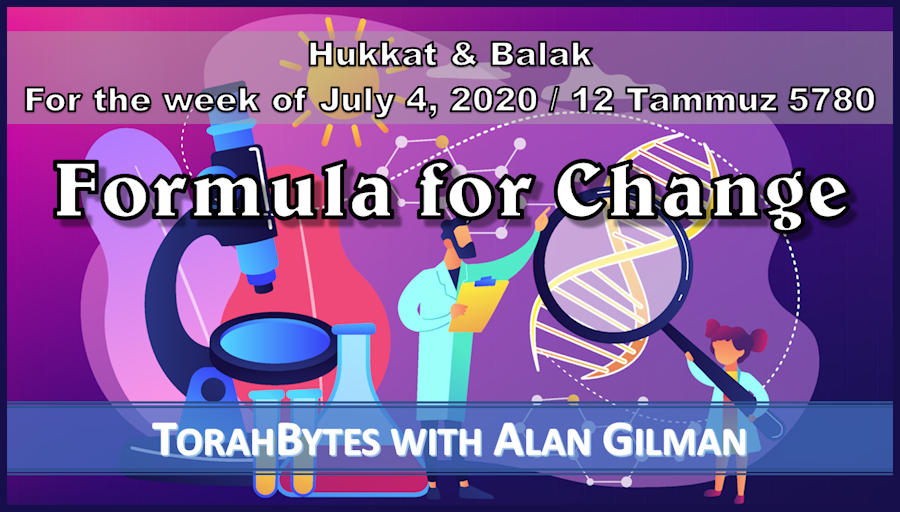For the week of July 4, 2020 / 12 Tammuz 5780
Hukkat & Balak
Torah: B’midbar/Numbers 19:1 – 25:9
Haftarah: Micah 5:6-6:8 (English: Micah 5:7 – 6:8)
Revised version of “The God-Led Life,” (posted the week of June 30, 2018 / 17 Tammuz 5778)
Download Audio [Right click link to download]
He has told you, O man, what is good; and what does the LORD require of you but to do justice, and to love kindness, and to walk humbly with your God (Micah 6:8)
This statement by the Hebrew prophet Micah is one of the most concise and balanced prescriptions for life and living. It is most instructive in times like these when we are faced with concerns over large-scale societal and systemic issues. When held in balance, these three directives equip us to effect positive change. Conversely, the neglect of any one of the three is potentially destructive. Neglect, not overemphasis, because keeping each in mind even to a small extent mitigates against the extremes that emerge when neglecting any one of the others.
The Hebrew word for justice is mishpat. It refers to the bringing about of what is right. The world is full of what needs to be righted. The Hebrew, asah mishpat, instructs us that this is the activity aspect of the triad. Making things right is something we need to purposely work at. To do justice demands being aware of injustice, devising practical strategies to confront it, and finding ways to make it last. That’s a heavy task, especially since the forces of injustice are not passive, nor do they play fair.
Once the concern for justice captures our hearts, it can blind us, however, to the other essentials of life. Thus, connecting it with the other two is brilliant. Too often the purveyors of justice leave much damage in their wake, forgetting that while Scripture instructs us to do justice, it is not to overwhelm our affections. Therefore, at the very same time, we must also love kindness. The word for kindness here is hesed, which is far more than simply being nice. The biblical concept of hesed is steeped in committed relationship to God and to others. Depending on the context, hesed can mean “covenant love” or “loyal love.” It’s the type of kindness often shown to a relative or long-time friend, a generous heart toward someone because of the bonds of committed relationship. But God through Micah is not reminding us to simply show loyal love to family and friends. It’s that the love normally reserved for those we hold dear is the love we are to extend to those we perceive as unjust.
When adjoined to doing justice, hesed allows for needed change, while at the same time avoiding hurting people in the process. Making things right can be painful, but true committed love greatly reduces potential harm to individuals and communities. When focusing on what we think is right, it is far too easy to forget that on every side of every issue is a fellow human being. It is loyal love for God and others that helps us keep everyone’s best interest in mind even when they wrong us.
We might think that these first two are sufficient to balance each other. Too much justice and we unnecessarily hurt people. Too much kindness allows injustice to flourish. What more do we need? What we still need is the third directive: v’hatznei-a lekhet im eloheikha, “and to walk humbly with your God,” which is a way to express a life that continually and personally relies on him. Without that, what we have is what is termed principle-based living. Principle-based living can be appealing but is deceptively misguided. Tragically, the Bible is often abused by treating it as an instruction manual. Passages are read in order to reduce them to moral lessons that we try to apply to contemporary situations. Because God is continually referenced, we don’t realize when we disregard him. God didn’t inspire the Bible and then remove himself from human affairs while he watches history unfold from afar. God doesn’t expect us to figure out life on our own. How do we know whether or not our sense of urgency and allocation of resources match those of God’s? The Bible provides us with life’s foundations and general priorities, but not the specifics. Wisdom, the ability to implement scriptural truth, is not drawn from study and intelligence alone, no matter how well informed we may be. Rather it stems from a life that keeps in close step with avinu malkeinu, our Father and our King.
Doing justice and loving kindness, without the intimate God-dynamic, however noble and well-intentioned, remains self-focused. The greatest of virtues driven by our own agendas eventually become idols, gods of our own making. No wonder so many endeavors done in God’s name have defamed him. But if we allow him to initiate what we give ourselves to and correct our course as needed; if we look to him to fill us with genuine love for others as we remember his faithful love for us; then we will become the embodiment of his intentions, accomplishing his purposes in his time and in his way.
Scriptures taken from the English Standard Version




